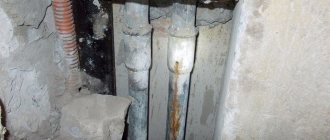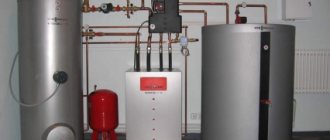Due to the accelerated development of the construction of new buildings and apartment buildings, housing disputes on civil issues are relevant. In many cases, we are talking about a violation of the integrity of common building communications, including heating pipes.
The result of an emergency situation may be causing property damage to the apartment owners and neighbors on the lower floor. If the battery bursts and the neighbors are flooded, who is to blame for the accident - the management company or the owner of the premises?
Who is responsible for the communication system
According to the terms of the agreement, the management company is responsible for all public communications. Communications include the heating and sewerage system, cold and hot water supply risers.
According to the provisions of housing legislation, the management organization is responsible only up to the 1st disconnect device, which is located on the riser branch of the communication system.
ATTENTION! If there is a pipe break in an apartment building up to the inlet valve, then the management company will be responsible for what happened.
The owner of the property is responsible for the condition of communications from the first locking device located in the apartment. Based on the information above, in order to determine who is to blame for a leaking riser, you must first determine the location of the breakthrough:
- If the battery ruptures and the integrity of the pipe after the shut-off valve is damaged, then the owner is responsible for the flood;
- if in an apartment building there is a leakage of the riser up to the valve, in this case the responsibility lies with the management company.
In some cases, the court places responsibility for the break in the branch of the common building riser after the 1st locking device on the management company. This usually happens when a heating pipe or radiator in a residential area breaks.
This is due to the fact that a heating pipe cannot burst without a reason. This can happen if the pressure in the pipes is too high or if accepted requirements for the operation of common property are not met.
The management organization must conduct routine inspections and repairs of the heating system in residential premises at least 2 times a year. After the inspection, the owner is issued a report with the results.
If the owners did not allow the specialist in, this is equivalent to improper use of utilities. Therefore, if an accident occurs, the fault lies with the owner of the living space.
Who is to blame for the pipe burst?
Who is to blame for the burst pipe in the apartment? This is a very important and necessary question that appears immediately after the flood problem is eliminated. In the case where this happened in a private house, laying the sewer system is the responsibility of the owner. Accordingly, all problems that may arise with the plumbing system fall solely on his shoulders.
If the breakthrough was in an apartment building, then several options are possible.
- If a pipe breaks from the riser to the first tap, then the management organization that manages this house will be responsible for all this; in fact, all complaints should be addressed there.
- The remaining pipes in the house are the problems of the residents. Therefore, you need to monitor the condition of the pipes, change them from time to time, clean them, and so on.
- If a problem arose with the heating system, then this is a completely different case - the management company should bear all responsibility if the tenant did not change anything in the system.
Now you know exactly what actions need to be taken if a pipe breaks. To ensure that such an incident never mars your life, you should regularly check the condition of the pipes. If they need to be repaired or replaced, the management organization must be notified. You also need to inspect the pipes that are installed in your home and replace various parts if necessary. The presence of rust, drips and other inconsistencies indicates that the pipe is in unusable condition
You also need to inspect the valve in the basement - it is important that it functions correctly and can be easily unscrewed and tightened. After all, if an emergency does happen, you will need to quickly turn off the water supply system
What are the responsibilities of the owner
The Housing Code of the Russian Federation imposes obligations on the owner of the property to ensure that the engineering systems in the apartment are in proper condition . In particular, the owner is obliged to constantly monitor the heating pipes. If necessary, the apartment owner must urgently carry out repairs by contacting a qualified specialist.
If the pipes in a residential building are in poor condition, the owner must contact the local housing office and call a specialist to the house. The call must be formalized; to do this, you need to fill out an application at the Housing Office, which the organization’s employees will register and set a date for repairing the heating system.
After the work is completed, the owner receives an acceptance certificate, which he and the foreman sign. If you follow all the rules for calling a specialist and accepting the work performed, the management company will bear responsibility for poor-quality installation of the heating system.
At his own expense, the property owner must repair appliances that have failed due to his fault. Moreover, repairs of this equipment can only be carried out by a company specialist, for which the consent of the housing office is required. If the owner replaces the heating equipment himself, then if the neighbors on the lower floor are flooded, the responsibility will fall on him.
An owner who independently examines a specific case of flooding must take into account important nuances:
- Knowledge of the basics of legislation does not guarantee achievement of a positive result.
- Each specific case is individual.
- The possibility of a positive outcome of the event depends on many factors.
Flooding of neighbors when heating is turned on
Local flooding of residential premises in a multi-storey building can occur for various reasons. This happens if utility lines are outdated or due to breakdown of plumbing equipment.
A common cause of an accident is a battery rupture as a result of turning on the heating system, which is an important component of general building utilities in any residential premises. If a pipe bursts, not only the homeowners can suffer, but also the neighbors below. If you flood your neighbors on the lower floor when you turn on the heating in the apartment, do not panic.
First of all, it is necessary to determine the cause of the accident, as well as find who is to blame for this situation and from whom to demand compensation for the losses caused. If a heating pipe bursts inside an apartment, this does not mean that the owner is the culprit for flooding the neighbors. The management company may be held liable for the accident.
Accidents of heating systems outside the heating season
It would seem that after the end of the heating season, the heating system cannot perform any “tricks”, since the coolant does not circulate in the system, therefore, there is no reason for the destruction of communications. And if in the summer someone tells you that a heating pipe in the house has burst, then this may well be the case.
After all, after each heating season, heat supply organizations conduct hydraulic tests of networks in order to identify problem areas and eliminate them in the warm period before the onset of cold weather.
To eliminate such cases, the coolant supply system (from the district heating unit to residential high-rise buildings) provides protection. With its help, consumers are temporarily disconnected from the supply lines, for which valves are installed in each house.
Rupture of a cast iron battery due to water hammer
However, if the notorious “human factor” intervenes, and during hydraulic tests, intra-house networks are involved in the process, then a breakthrough in the heating system and subsequent flooding is inevitable.
This happens due to mechanical destruction of the supply pipes or radiator inside the apartment, which cannot withstand high pressure during hydraulic tests.
When such a situation arises, the apartment is flooded with water, which was used to fill the in-house heating system for the summer period.
In such a situation, the algorithm is as follows:
- notify the management company about the incident;
- record the fact of the accident by drawing up a flooding report in the proper form with the involvement of HOA or housing office employees, as well as neighbors, in its preparation;
- record the consequences of the flood on video and with a camera;
- start saving personal belongings.
Do not rush to eliminate the consequences, since it will not be possible to find those responsible for the incident on your own, then the most correct option for further action for the affected residents will be to go to court.
And to do this, you should draw up an expert assessment from a qualified appraiser, which will serve as evidence of your material claims against the guilty party in court.
- If the accident occurred outside the heating season, then it is clearly the fault of either the management company or the district heating unit, which did not control the shutdown of your home during the hydraulic tests. In this situation, you should not rush to clean up the consequences of the flood so that experts can document the damage to property in their report.
- If such an incident happened during the heating season, then eliminating the leak or breakthrough comes first, since, unlike tests, the supply of coolant is constant, which means your apartment will be flooded until the tap on the riser in the basement is turned off Houses.
Did you like the article? Subscribe to our Yandex.Zen channel
In what cases is the owner to blame?
It is not always possible to obtain compensation for damage from the organization servicing an apartment building. The court may rule in favor of the defendant. This can happen if the owner unauthorizedly made reconstruction of the living space. The homeowner can move the battery, change the number of sections, replace the heating device with or make an incorrect connection to the common heating riser.
The project of an apartment building provides for a specific heating system, indicates the type of battery and the materials used. When renovating an apartment, owners often change heating devices, installing radiators of a different configuration. For example, today bimetallic radiators made of steel and aluminum are popular.
This compact heating device looks more aesthetically pleasing than a cast iron radiator. Unfortunately, owners usually do not know that replacing a heating device requires an individual project agreed upon with all authorities.
When choosing a new radiator, you need to compare the technical characteristics of a modern heating device and the equipment installed when the house was put into operation. After replacing and moving the battery or when increasing the heating area, it is necessary to carry out start-up tests and draw up a report.
ATTENTION! If you decide to replace the internal heating system, you must familiarize yourself with the Rules for the technical operation of thermal power plants and SP 60.13330.2012 “Heating, ventilation and air conditioning.”
The owner is responsible if he independently replaced the components of the heating system. If the apartment is privatized, it is the property of the property owner, so he will be to blame for the bursting of a pipe in the premises. According to the provisions of the law, the owner of the residential area is obliged to maintain all utilities in good condition.
Battery failure due to the fault of third parties
If the heating system in a residential area breaks due to any actions of third parties, in most cases the property owner will be to blame, who is legally obligated to prevent such situations from occurring. However, if he can collect the evidence necessary for the ship's bailiffs that the battery burst due to the fault of third parties, he may be relieved of responsibility.
Alternatively, an emergency situation may occur if there is a manufacturing defect in the heating system or battery. There are cases when the riser in an apartment leaks due to the fact that the radiator was installed by an inexperienced plumber.
If the heating device fails, do not immediately throw away the damaged elements. They will be useful as evidence in case of poor-quality repairs.
A construction inspection can reveal who is to blame for violating the integrity of the battery, as well as refute or prove the presence of a manufacturing defect.
Who should pay if there are tenants living?
In recent years, apartments have often been rented out, but tenants do not always treat their rented housing as responsibly as its owners. By law, tenants are also required to keep the heating system in working order. Tenants will be held liable if it is proven that they intentionally caused damage to the property.
In this case, the tenants of the living space must compensate in full for the damage caused to the neighbors and the property owner. However, not everything is as simple as it seems at first glance.
According to the rules of the civil legislation of the Russian Federation under residential rental agreements, the landlord is obliged to ensure the provision of utilities to the tenant and to promptly carry out repairs of devices that are located in the residential premises and are intended to provide various utility services.
Based on the above, in order to find out who is to blame for the battery breakdown, it is necessary to determine under what exact circumstances the neighbors were flooded and what contributed to the emergency situation. Let's look at examples:
- If the mixer fails as a result of the expiration of the equipment's service life, then the fault lies with the lessor.
- If the heating system breaks down due to improper operation of the equipment, the tenant will be held responsible.
If the rental agreement assigns the responsibility for maintaining the equipment used to provide utilities to the tenant, then the responsibility for damage caused will be on the tenant.
If it is established that the tenant is at fault for the damage caused, and the owner of the living space voluntarily compensates the damage to the victim, he has the right to demand the amount he paid from the tenant by way of recourse. Typically, tenants refuse to pay for the damage they have caused.
Then the lessor can go to court, where he must prove the fact that the damage was caused by the tenant and compensation for the amount of damage. He must provide the following documents to the executive body:
- acts on flooding of residential premises;
- expert opinion;
- rental agreement;
- agreement on voluntary repayment of damage;
- payment document confirming payment of the amount of damage;
- receipt.
What to do first?
If the heating battery bursts, then the first thing to do is turn off the water and try to remove the water that has already poured into the room . You will need to figure out what happened and where to call later.
Step-by-step action plan:
- Place any large container under the stream of boiling water. It is better to use a plastic one, since if you use a metal one, it will simply heat up to 80-95% degrees, which will make it impossible to carry the container normally (to drain the collected water). We recommend using a plastic basin or bathtub for children.
- After installing the container, be sure to leave someone on duty so that he can constantly remove the drained water. Ideally, use two containers, using them alternately (while we are draining from one, we are filling the other).
- While everyone is busy collecting and draining boiling water, someone must run to the basement and turn off the central valve of the heating system. This needs to be done as quickly as possible, before you flood your neighbors in the riser.
- After shutting off the central valve, you need to call an emergency team of plumbers or utility workers.
The consequence of a breakthrough could be flooding of neighbors and if the fault lies with you, the court will recover a huge amount of money
Legal assistance when flooding someone else's apartment
Not everyone knows what to do to protect their own rights and not incur high costs to compensate for damage to their flooded neighbors. To do this, you need to contact a specialist who specializes in providing legal services.
IMPORTANT! If the owner is sure that the battery burst through no fault of his own and wants to find out who is to blame for the emergency, professional lawyers will help sort out this issue and relieve the owner of the living space of the obligation to compensate for the amount of damage.
In order to place all responsibility for a battery break in an apartment on third parties, you need to competently substantiate your own position in the presence of a bailiff. This is easier to do with the help of a professional lawyer who has skills in civil cases and is well versed in the current legislation.
As a result, the owner can recover from the person responsible for the flooding of the residential premises compensation for material losses resulting from a battery breakdown . When neighbors are flooded, first of all, it is necessary to find out whose fault the emergency occurred.
Therefore, the owner must maintain composure and find out the reason for the failure of the heating system, as well as document the accident and the extent of the damage. The owner of the property, the management organization, the tenants, or third parties may be to blame for the accident.
Where to call if a pipe burst in your apartment
If you find a leaking pipe, hurry up and ask a plumber, whom the house management organization (DUK) must send. You should also go there if the pipe has already burst.
You can find information about which company services a specific address via the Internet, you can also look at advertisements at the entrance or see its name on the rent receipt. It is better to keep such numbers at hand, specifying them in advance. You can contact management specialists on weekdays during business hours. Most often they also have some kind of emergency number that is available 24 hours a day.
If a leak occurs when the DUK is not working, you need to call either its emergency dispatcher or the emergency repair service in the city.
The dispatcher will contact specialists and send them to the scene of the incident. You must understand that such actions can only be resorted to if the pipe is leaking so badly that it is impossible to cope with the problem on your own.
What to do if a hot or cold water pipe bursts
If a leak occurs in pipes with cold or hot water, you should contact the employees of the management company or the emergency department.
. They will send plumbers, and if the damage is serious, they will contact the emergency services themselves. If it is after hours, immediately dial the Vodokanal repair service number. The dispatcher will send specialists to you. After eliminating the accident, ask to draw up a report indicating the location of the leak and the cause of the problem.
Residents often get confused and don’t know what to do to prevent water from flooding all the lower floors
. When a pipe bursts and water arrives quickly, the actions fit into the following scheme:
- Turn off the electricity supply to the room.
- Shut off the common riser or discharge pipes in the apartment.
- Report the leak to the emergency dispatcher or management company employees.
It is easier to fight a flood with helpers. While one person calls the specialists, the rest scoop out the accumulated water, preventing it from leaking to the lower floors.










